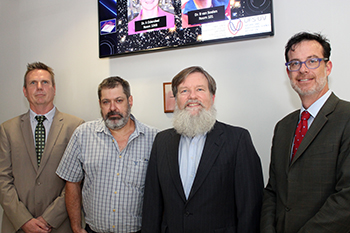Latest News Archive
Please select Category, Year, and then Month to display items
20 December 2021
|
Story Igno van Niekerk
|
Photo Igno van Niekerk
![]() Dr Samantha Potgieter, Senior Lecturer in the Department of Internal Medicine and Dr Nicholas Pearce, Senior Lecturer in the Department of Surgery comment on their team members’ commitment and determination during the pandemic.
Dr Samantha Potgieter, Senior Lecturer in the Department of Internal Medicine and Dr Nicholas Pearce, Senior Lecturer in the Department of Surgery comment on their team members’ commitment and determination during the pandemic.
On the forefront of the battle against the COVID-19 pandemic, two UFS doctors are leading a team of inspired healthcare workers in a superhuman effort to make a positive difference.
With the pandemic in its second year and the recurring challenges of new waves and strains consistently in the news, one would expect the doctors to be tired. However, quite the opposite is true. Upon entering the office where Dr Samantha Potgieter, Senior Lecturer in the Department of Internal Medicine and Dr Nicholas Pearce, Senior Lecturer in the Department of Surgery are in a meeting with colleagues, the debate is vibrant; an energetic sense of mission.
Miraculously succeeded
My brief is to collect stories and experiences they’ve had over the past 18 months at the Tumelo ward for general and high-care patients, where the team has miraculously succeeded in not running out of oxygen or ventilators, despite handling high volumes of patients from the Free State and Northern Cape. “We saw those pictures of piled-up bodies in Italy. We were committed to avoiding that at all costs. And we did.”
Success stories? First mentioned are their team members’ commitment and determination. The team had to stand in when families could not support dying patients. “They did not die alone. Our team was there.”
“Really sad and frustrating are the deaths that could have been prevented. Unvaccinated patients. They arrive ill, wanting to know if they can get it. Too late...” – Dr Nicholas Pearce
Then came hope
Sad stories? The past year has had its share of sad stories. “Someone comes in during the morning, needs oxygen, in the afternoon they are in ICU, then ventilator – and then they die. We’ve never faced anything like this before.”
Then came hope. Vaccines. Dr Pearce is in charge of the vaccination site at Universitas Hospital. “Really sad and frustrating are the deaths that could have been prevented. Unvaccinated patients. They arrive ill, wanting to know if they can get it. Too late ...” He opens his cell phone – shares the stats. “We can handle 2 000 vaccinations a day. At the moment about 250 comes in.” He shakes his head.
“We can beat this virus, but we need to stand together ...”
NASA Deep Space Navigation engineer presents at Naval Hill Planetarium
2017-03-30

From the left: Chris du Plessis; US Consulate, Johannesburg,
Prof Petrus Meintjes; Dept of Physics UFS, Christopher Jacobs;
NASA, and Anthony Deaton; US Consulate Johannesburg.
Photo: Rulanzen Martin
The University of the Free State (UFS) hosted NASA Deep Space engineer Christopher Jacobs on 27 March 2017 at the Bloemfontein Campus. The engagement was hosted by Prof Matie Hoffman of the Department of Physics and the Department of Institutional Advancement, in collaboration with the US Consulate General in Johannesburg.
Jacobs is stationed at NASA’s Jet Propulsion Laboratory (JPL) at the California Institute of Technology and has served as the Reference Frame Calibration task manager for 25 years. In this role he has been responsible for delivering the reference frames used to navigate NASA missions such as the Mars Science Laboratory to planetary targets.
His visit to the UFS included a presentation to the Department of Astrophysics at the Faculty of Natural and Agricultural Sciences and at the Naval Hill Planetarium in Bloemfontein where he spoke on Stellar GPS: Navigating the Solar System. He also spoke about the latest research and developments at NASA in Astrometry. The visit will establish and develop shared interests and possible collaboration with UFS and other institutions of interest in the country. “South Africa, because of its well-placed geographic location in the southern hemisphere, holds a lot of answers to astronomy,” Jacobs said.
He has an active interest in professional and public education, and outreach, having given public lectures around the world. “Astronomy brings people together and is a point of common interest that is key in solving environmental and geographical challenges such as climate change, therefore global cooperation is important,” he said.
Prof Hoffman welcomed the initiative by the US Consulate and the possible outcomes of joint efforts to position the UFS as a key partner in South Africa on NASA’s astronomy projects. In the coming weeks Jacobs will speak at high schools in Gauteng including the Mae Jemison US Science Reading Room in Mamelodi, Pretoria, a centre that is focused on promoting science education.